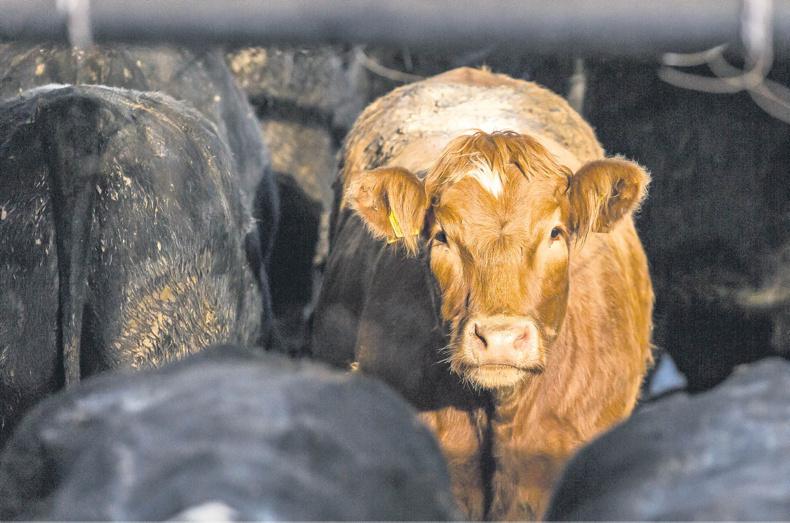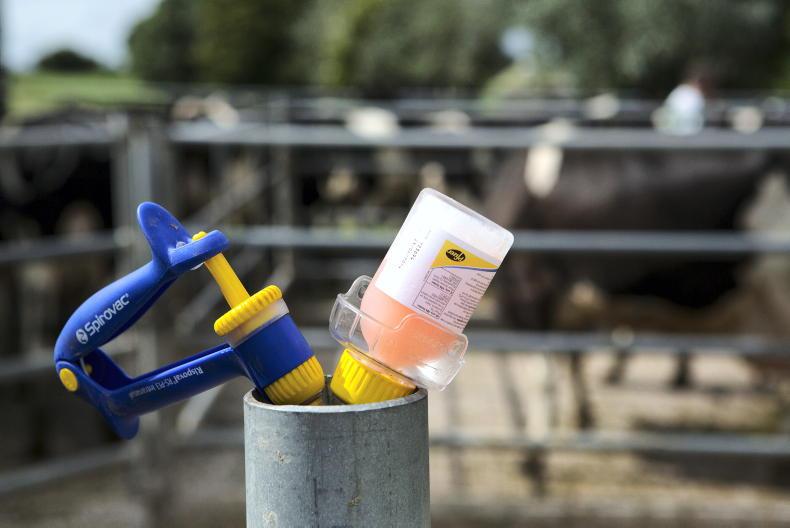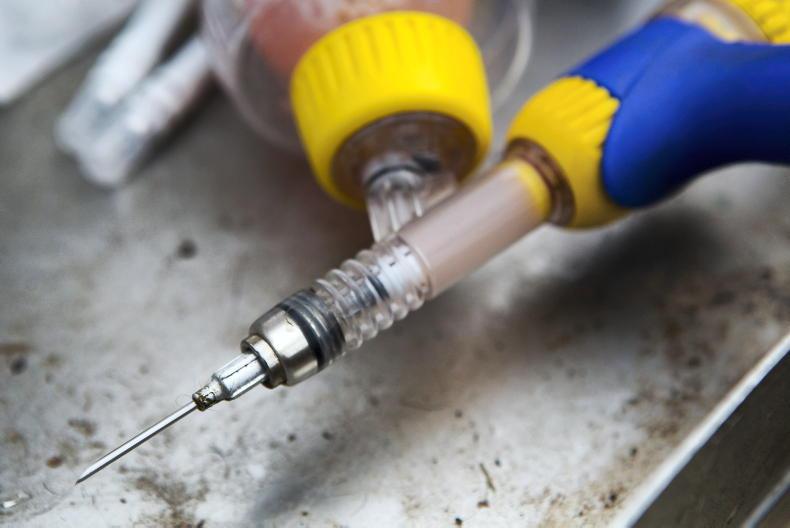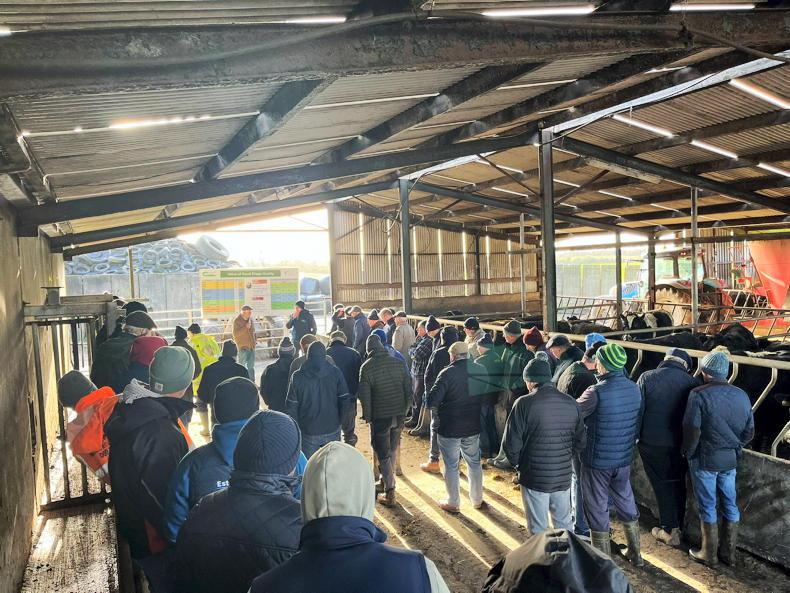New regulations on veterinary medicines will come into effect in January 2022 which will force us to examine the way we use antibiotics on our farms. There will be particular restrictions around the use of antibiotics for group treatments for prophylaxis (treatment of healthy animals to prevent disease in healthy animals ( prophylaxis), particularly in groups of animals.
The new legislation will also restrict the use of antibiotics in animals that are in contact with a sick animal diagnosed with a bacterial disease ( metaphylaxis). An example of prophylaxis is the blanket use of intramammary tubes containing antibiotics in dairy cows at drying off, while an example of metaphylaxis is the feeding of CTC powder to a group of calves because a number of animals are coughing. The overarching aim of the new regulations is to protect human health by reducing antimicrobial usage in food producing animals. The new regulations include a reinforced ban on the use of antibiotics as growth promoters, as well as the following provisions and principles:
Antibiotics must not be used routinely.Antibiotics must not be used to compensate for poor hygiene, inadequate animal husbandry, or poor farm management. Antibiotics must not be used to prevent disease, except in very exceptional circumstances .Antibiotics must not be administered to in-contact animals, except when the risk of the spread of an infection or infectious disease in the group of animals is high and no other appropriate alternatives are available. There will be increased restrictions around the prescribing and use of antibiotics (e.g. Highest Priority Critically Important antibiotics HP-CIAs).Veterinary prescriptions should be based on clinical examination or other proper assessmentsAntibiotics will be limited to the amount required for the treatment of the animal concerned and only valid for five days. The focus of the new regulations is to protect human health first and foremost. Addressing the challenge of AMR has been the key driver for the new content in these regulations. The new regulations will require a change in the way we use antibiotics and practices such as the use of antibiotics in blanket dry cow therapy and the prophylactic or preventative use of in-feed antibiotics to alleviate the threat of disease in intensive production systems just in case animals get sick will no longer be an accepted norm. Although veterinarians, as the prescribers, are the gatekeepers of antimicrobials, farmers also have a key role to play by working with their vet to keep antibiotics effective for future generations, through improving animal health and reducing antibiotic usage on farms.
One Health conference
The Department of Agriculture, Food and the Marine are pleased to support and participate in an upcoming conference organised by Teagasc.
The ‘One Health Antimicrobial and Anthelmintic Resistance Conference – Awareness to Action’ will take place in the Tullamore Court Hotel on Wednesday 27 November 2019. The conference will focus on creating a greater awareness amongst farmers and professionals serving the agri-food industry.
There will also be an emphasis on clear concise practical actions which can be taken on Irish farms to reduce their need to use antimicrobials and anthelmintics. The timing of the conference coincides with European Antibiotic Awareness Day on 18 November and World Antibiotic Awareness Week (18-24 November). Registration for the event is free and preregistration is a prerequisite. For further information and booking visit www.teagasc.ie/amrconference.
Thursday November 28, the day following the conference marks the inaugural animal health awareness day. This is a Department of Agriculture-led initiative to raise awareness of the importance of animal health in enhancing farm productivity, livestock sustainability, animal welfare, food safety, public health and access to international markets. There will be a seminar held in Corrin Mart on the day entitled “Animal Health, from farm to the food shelf” where these themes will be discussed in more detail. A series of events will also be held in third level and agricultural colleges to increase awareness of the importance of animal health to a vibrant livestock industry among the next generation of farmers.

New regulations on veterinary medicines will come into effect in January 2022 which will force us to examine the way we use antibiotics on our farms. There will be particular restrictions around the use of antibiotics for group treatments for prophylaxis (treatment of healthy animals to prevent disease in healthy animals ( prophylaxis), particularly in groups of animals.
The new legislation will also restrict the use of antibiotics in animals that are in contact with a sick animal diagnosed with a bacterial disease ( metaphylaxis). An example of prophylaxis is the blanket use of intramammary tubes containing antibiotics in dairy cows at drying off, while an example of metaphylaxis is the feeding of CTC powder to a group of calves because a number of animals are coughing. The overarching aim of the new regulations is to protect human health by reducing antimicrobial usage in food producing animals. The new regulations include a reinforced ban on the use of antibiotics as growth promoters, as well as the following provisions and principles:
Antibiotics must not be used routinely.Antibiotics must not be used to compensate for poor hygiene, inadequate animal husbandry, or poor farm management. Antibiotics must not be used to prevent disease, except in very exceptional circumstances .Antibiotics must not be administered to in-contact animals, except when the risk of the spread of an infection or infectious disease in the group of animals is high and no other appropriate alternatives are available. There will be increased restrictions around the prescribing and use of antibiotics (e.g. Highest Priority Critically Important antibiotics HP-CIAs).Veterinary prescriptions should be based on clinical examination or other proper assessmentsAntibiotics will be limited to the amount required for the treatment of the animal concerned and only valid for five days. The focus of the new regulations is to protect human health first and foremost. Addressing the challenge of AMR has been the key driver for the new content in these regulations. The new regulations will require a change in the way we use antibiotics and practices such as the use of antibiotics in blanket dry cow therapy and the prophylactic or preventative use of in-feed antibiotics to alleviate the threat of disease in intensive production systems just in case animals get sick will no longer be an accepted norm. Although veterinarians, as the prescribers, are the gatekeepers of antimicrobials, farmers also have a key role to play by working with their vet to keep antibiotics effective for future generations, through improving animal health and reducing antibiotic usage on farms.
One Health conference
The Department of Agriculture, Food and the Marine are pleased to support and participate in an upcoming conference organised by Teagasc.
The ‘One Health Antimicrobial and Anthelmintic Resistance Conference – Awareness to Action’ will take place in the Tullamore Court Hotel on Wednesday 27 November 2019. The conference will focus on creating a greater awareness amongst farmers and professionals serving the agri-food industry.
There will also be an emphasis on clear concise practical actions which can be taken on Irish farms to reduce their need to use antimicrobials and anthelmintics. The timing of the conference coincides with European Antibiotic Awareness Day on 18 November and World Antibiotic Awareness Week (18-24 November). Registration for the event is free and preregistration is a prerequisite. For further information and booking visit www.teagasc.ie/amrconference.
Thursday November 28, the day following the conference marks the inaugural animal health awareness day. This is a Department of Agriculture-led initiative to raise awareness of the importance of animal health in enhancing farm productivity, livestock sustainability, animal welfare, food safety, public health and access to international markets. There will be a seminar held in Corrin Mart on the day entitled “Animal Health, from farm to the food shelf” where these themes will be discussed in more detail. A series of events will also be held in third level and agricultural colleges to increase awareness of the importance of animal health to a vibrant livestock industry among the next generation of farmers.











SHARING OPTIONS